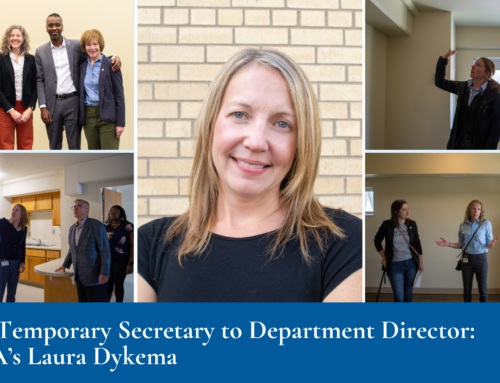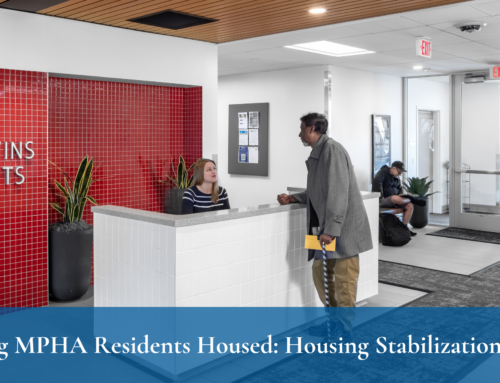Today, Senator Tina Smith and Minneapolis Mayor Jacob Frey joined MPHA staff, residents, and partners to celebrate the groundbreaking of 84 new deeply affordable family homes across Minneapolis. The Family Housing Expansion Project (FHEP) will bring 26 two- and 58 three-bedroom units in fourplexes and sixplexes to 16 sites across Minneapolis. These new buildings will be a part of MPHA’s deeply affordable scattered site family housing portfolio. Sixteen of the units will be disability accessible, with another 17 being high-priority homeless units with services funded through Hennepin County’s Coordinated Entry program. The agency estimates these 84 new homes will be able to serve approximately 420 families over the next 30 years. This project is the agency’s largest new-unit development in more than two decades.
“For families from MPHA’s family waiting list, today is a life-changing moment,” said Abdi Warsame, Executive Director/CEO of the Minneapolis Public Housing Authority. “For 84 families, and the hundreds to follow them in the years to come, the promise of stable, deeply affordable housing becomes one step closer to reality. This project demonstrates the power of partnership in addressing our region’s affordable housing crisis—local leaders making major financial investments to supplement federal financing tools accessible to MPHA. The success of this project provides a blueprint for developing new, high-quality, deeply affordable housing across Minneapolis.”
“Everyone deserves a safe, stable place to call home. Without it nothing else in your life works – not your job, your health, your family, or your education,” said U.S. Senator Tina Smith. “The Minneapolis Public Housing Authority’s work has been critical in providing affordable housing for families across the city. Making 84 new deeply affordable units available is going to have a ripple effect of positive impacts. This is an example of how the federal government can partner on important projects and what can be accomplished thanks to the Inflation Reduction Act and the American Rescue Plan Act.”
“Every resident in Minneapolis deserves safe, stable, and permanent housing – that is affordable to them,” said Minneapolis Mayor Jacob Frey. “Since my first term, we have invested record amounts of new affordable housing in the city, especially focusing on deeply affordable units. Year to year we have seen a 92% increase in multifamily housing unit permits, and this has an incredible impact on families in our community. Thank you to MPHA for leading this important work through the Family Housing Expansion Project, and for placing our Minneapolis families in affordable homes.”
The agency maintains more than 700 deeply affordable family homes scattered across Minneapolis through its wholly owned and controlled nonprofit, Community Housing Resources (CHR). The agency maintains a family housing waitlist of nearly 7,500 people. More than 80 percent of those waitlisted are households of color. The Family Housing Expansion Project aims to address the significant unmet demand for this kind of housing. And while the 84 new units will live in a separate legal entity, Family Housing Resources, LP, they will function identically to the agency’s CHR homes.
These scattered site homes are a critical piece of city infrastructure, as they are a proven tool to provide families a solid foundation for upward mobility. Of the nearly 3,100 residents currently living in CHR homes, 87 percent are Black/African American, 55 percent are ages 17 or younger, 85 percent of households are female-led, and two-thirds of the households have five or more family members living there—families with young children. Of the current heads of household, 19 percent were employed when entering their new home. On average, these residents earned $20,722 a year in income. Today, 67 percent of these residents are employed, earning an average of $36,639 a year, with more than 60 percent of these residents’ earned income increasing while in these homes.
From FHEP’s inception, MPHA residents have been involved in every step of the process. Before the agency conducted any external engagement, agency staff sat with residents to understand what should be prioritized in any new-unit developments. The agency created a resident design panel, connecting residents with project architects to provide guidance on everything from layout designs to finishings used on surfaces throughout the new units. The unique resident-led approach afforded project architects invaluable insights, including an emphasis on maximizing storage space throughout the units not previously considered.
As with the landmark $27 million renovation of the Elliot Twins, MPHA will comply with both a Memorandum of Understanding (MOU) with the City of Minneapolis as well as U.S. Department of Housing and Urban Development (HUD) regulations requiring any residents temporarily relocated off-site the right to return to the property. And where residents are relocated to other units in the agency’s portfolio during construction, MPHA will cover all associated relocation costs for residents.
The Family Housing Expansion Project was enabled in part by MPHA transferring its scattered site family housing portfolio to CHR in October 2020 through HUD’s Section 18 program. This transfer from HUD’s Section 9 (public) platform to the Section 8 (voucher) program, where MPHA, through CHR, was able to receive more than double the federal subsidy it was previously receiving to manage the same homes at the same income and affordability levels. Through the Section 18 conversion, MPHA prioritized keeping residents informed of the process and provided education around residents’ rent portions and units remaining unchanged in their deeply affordable status. The agency worked to make the conversion a seamless transition for residents, resulting in zero families being displaced.
Unique to FEHP, MPHA is using modular construction for the first time. This innovative method delivers cost-effective, move-in ready units 33 percent faster than traditional construction (i.e. stick-builds). The process also reduces the onsite and neighborhood interruptions because significant work is done offsite in advance of delivery. Additionally, the final modular product is superior to traditional stick-builds and provides MPHA a cost-effective tool for developing new, high-quality homes on urban lots.
The Family Housing Expansion Project was made possible through financing across various partners. This included $19.9 million in equity from Low-Income Housing Tax Credits (US Bank Community Development Corporation), a $12.5 million contribution from MPHA, a $8.9 million permanent loan to cover project costs (Citi Community Capital), $4.6 million in federal ARPA dollars awarded from the City of Minneapolis, a $1.4 million Local Housing Incentives Account (LHIA) award from the Metropolitan Council, a $1.2 million award from the City of Minneapolis’ Affordable Housing Trust Fund (AHTF), and a $500,000 award of Hennepin County’s Affordable Housing Development Accelerator fund. US Bank Community Development Corporation will provide a $25 million construction loan via Housing Revenue Bonds issued by Minneapolis’ Community Planning and Economic Development department. The project also benefitted from more than $500,000 in equity through solar tax credits, which more than doubled because of the recent federal Inflation Reduction Act. The project’s solar system (361.6 kW) is projected annually to cover nearly 30 percent of all electrical consumption in the new homes.






